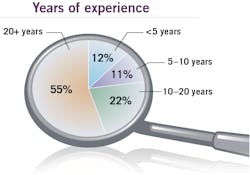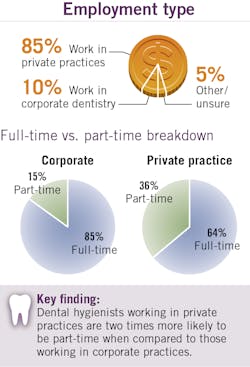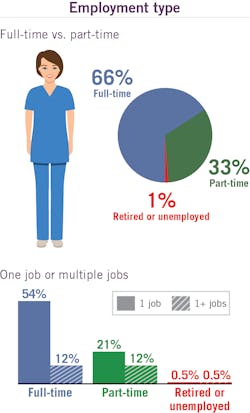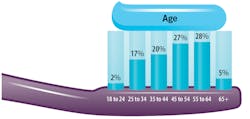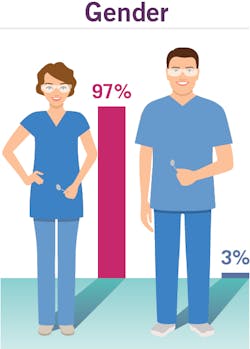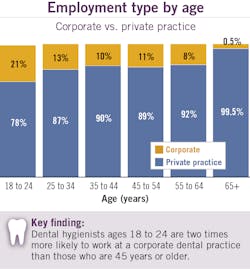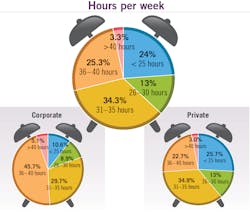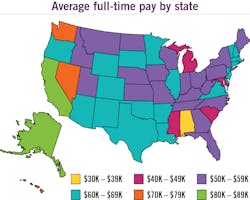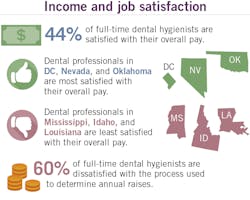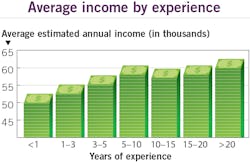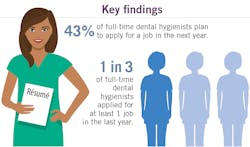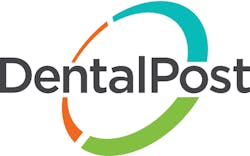Highlights
Audience profile
Consisting of responses from 8,855 dental professionals, including 3,977 hygienists, the 2020 DentalPost–RDH Magazine Salary Survey is the largest of its kind. The survey consisted of 30 questions, ranging from compensation to how respondents felt about their roles in the dental community and the changes that have occurred in the industry. These respondents had a wealth of industry experience:- More than half of the respondents had 20+ years of experience.
- 1 in 5 had 10–20 years of experience.
- 1 in 4 had fewer than 10 years of experience.
Flexible ways to earn income
Full-time and part-time private practice and corporate dental support organization (DSO) RDHs enjoy a level of flexibility to earn, unlike many other professionals.
The majority of RDHs (85%) surveyed work in private practices, with only 10% reporting working in corporate dentistry and another 5% other/unsure. This is in line with the estimated 15% share that DSOs and other large group practices have within the industry.
66% work full-time
A much greater percentage of private practice RDHs work part-time than in corporate dental environments. In fact, a hygienist in private practice is two times more likely to be part-time than in those corporate practices. Hygienists who are younger tend to work full-time, and this decreases steadily as they get older.
RDHs as heads of household
Hygienists between ages 35 and 44 are the most likely to have children under the age of 18 living in the household. Likewise, they are the least likely to be the sole income provider.
What are dental educators saying?
“The need for talented hygienists to enter the industry is increasing. With so many boomers near retirement, the next few years look bright for millennials and Gen Zers entering the industry. For Gen Xers, the coming decade will put pressure to go beyond just maintaining CE credits. To remain competitive as high earners, Gen Xers and other experienced RDHs will need to invest in new skills. RDHs who keep up with trends and specializations will be the most in demand.” —Rachel Wall, RDH
Today’s dental hygienist
RDH as a lifetime career
In short, this is a profession people do for a lifetime. Being an RDH offers professional flexibility as age and life priorities change. Similar to other health-care sectors, the dental industry is aging.
- 61% of respondents were 45 and older.
- There were equal numbers of RDHs ages 45 to 54 and ages 55 to 64.
- There were twice as many RDHs 65+ as 18 to 24.
Generational impact
Many boomers and some Gen X members are postponing retirement or opting for a “preretirement” approach. This includes decreasing hours, shifting from full-time to part-time, or working as a temp. As the industry struggles to educate, train, and introduce new hygienists, it is a job seeker’s market for many boomers and Gen Xers.
Among Gen Zers and millennials, there is no shortage of jobs for aspiring hygienists. However, these jobs may not offer the full schedule they are seeking from a single employer. With boomers and Gen Xers eventually retiring in the 2020s, there is potential for an RDH shortage similar to the one in the early-to-late 1990s.
Gender: hidden stats about new RDHs
Industry-wide, women have historically occupied the vast majority of RDH positions. In our survey, 97% of respondents were female.
This year, the large number of respondents allowed us to take a closer look to see if the 3% male participation was an anomaly or a trend to watch.
Among various salary surveys conducted by RDH magazine and DentalPost, males have typically been between 1% to 2% of survey respondents. With a higher concentration of men among newer RDHs, we believe males entering the RDH profession is a trend to watch.
- Male RDHs with 3 to 10 years of experience are now employed at two times the rate as male RDHs with 10+ years’ experience.
- Almost 10% of RDHs with less than one year of experience are male.
DSOs are leading the charge in hiring males. Regardless of geographic setting (metropolitan or rural), a male is four times as likely to start his career at a DSO. Interestingly, a female of similar experience is two times as likely to start her career at a DSO. This prompted us to explore further the ability of DSOs to attract new talent.
DSOs attract new and young RDHs
DSOs hold a significant advantage in attracting both first year and younger hygienists. Because of their close relationships with schools, and their ability to offer a full-time schedule with benefits, many entering the profession will start at a DSO.
The DSO hiring advantage drops with time. Data shows this is especially true once an RDH has been in the industry for 10 or more years. RDHs with more than 10 years of experience are more likely to be attracted to private practice employers than DSOs.
“Hygienists are looking for different things throughout their career. Established hygienists prioritize and appreciate the flexibility of our profession. To an established hygienist, a well-fitting small practice can feel like an extension of family, offering a feeling of safety and security.
For newer hygienists, working as many hours as possible and making money are often a necessity when entering the profession. Beyond the cost of school, life events such as a new house, a new car, or growing family can add pressure financially. Newer hygienists express a desire for a smaller practice, but struggle to find a private practice offering full-time employment with benefits.” —Heather Mapp, MEd, RDH, president of Dental Hygiene Seminars
How they work
Most hygienists identify as full-time (66%), with the remaining as part-time (33%). Being an RDH means more than being full-time or part-time; often it means deciding between one job or multiple jobs.
Entrepreneurial RDHs and side hustles
As a response to limited hours offered, or to supplement income, today’s RDHs are increasingly entrepreneurial. In fact, there are a variety of ways RDHs are earning income into the 2020s, such as clinical and public health work, acting as sales representatives, educators/instructors, and being speakers at industry events
Hours worked
The majority of RDHs report working 30 to 40 hours per week. RDHs working at DSOs tend to work more hours per week, 36 to 40, compared to 31 to 35 hours per week among RDHs working at private practices.
- RDHs who work at a DSO are two times more likely to work 36 to 40 hours than RDHs who work at a private practice.
- RDHs who work at a private practice are 2.4 times more likely to work 25 hours or less than RDHs who work at a DSO.
Compensation
Average pay for an RDH varies widely from state to state. A hygienist in Washington, DC, will average almost $90,000 per year, which is $30,000 above the national average of $60,000. In Alabama, the lowest-paying state, the average is $39,000.
- 44.2% of full-time RDHs are satisfied or very satisfied with their overall pay.
- About 1 in 3 (31.8%) full-time RDHs are dissatisfied or very dissatisfied with their overall pay.
- More than half (59.8%) of all full-time RDHs are dissatisfied or very dissatisfied with their annual raises.
Just under half (44%) of full-time hygienists are satisfied with their level of compensation. Almost half of the respondents make between $51,000 and $70,000, and 16% are making more than $80,000.
However, 60% are dissatisfied with how their pay is determined. This is critical information, indicating a sense of frustration in the process, which could diminish loyalty and job satisfaction.
The biggest concern with respect to compensation was the leveling off of income. Based on our survey, this seems to be a prevalent trend after five years of employment. At the upper limits, several RDHs expressed frustration that their base wage rates have remained unchanged for more than a decade.
Highest paying markets (per hour)
Of the top six paying metro areas, four are in California.
- San Francisco-Oakland: $57
- Los Angeles: $51
- Sacramento: $50
- San Diego: $49
- Washington, DC: $49
- Seattle: $47
Capping out?
How much does experience impact annual income? In the first five years, RDHs tend to make quick income gains, about $1,000 in annual income per additional year of experience. After five years, earnings plateau and income remains flat.
Many highly paid respondents voiced resentment at being forced to personally absorb the business fluctuations in the practice. In many practices, RDHs report being asked to clock out when there wasn’t a patient that hour, or to take a long lunch on slower days. One hygienist wrote, “We don’t get paid for openings in the schedule. WTH?!”
Another hygienist was excited about the “perk” she received, which was to be paid time-and-a-half when she worked more than 8 hours. The law requires this in most states.
DentalPost explains: DSOs versus private practices—do they pay RDHs differently?
The majority of RDHs are paid hourly. Receiving a daily rate or annual salary is rare. As an alternative to hourly wages, RDHs are 50% more likely to be paid an annual salary with a DSO and more than three times more likely to negotiate a daily rate with a private practice.
- Among private practices and DSOs, there is an 80% chance RDHs will be paid hourly.
- DSOs are less likely to pay a daily rate (2.7%) versus private practices (9.5%).
- DSOs are more likely to pay an annual salary (7.1%) compared to private practices (4.5%).
Percentage of production or commissions
RDHs reported commission, percentage of production, and other performance pay approaches as appealing ways of getting paid. Hygienists working for a percentage of production rather than an hourly wage seemed much happier with their careers and income. Those being paid a guaranteed base against a percentage of production reported the highest level of satisfaction.
- Of RDHs with high satisfaction, commissions of 30% to 33% against guaranteed base pay were common.
- DSOs are twice as likely to pay a percentage of production (22.2%) compared to private practices (10.6%).
- RDHs with 3 to 10 years of experience were paid with a percentage of production about 14% of the time, whereas RDHs with 20-plus years of experience were paid with a percentage of production 10.4% of time.
Experienced RDHs and percentage of production pay
RDHs with more than 20 years of experience are both the highest paid and the least likely to receive a percentage of production or other commission-based pay. Whether this is because dental practices cannot afford it or these RDHs are not asking is unknown. This is a topic we plan to explore in the next DentalPost–RDH Magazine survey.
DentalPost explains: Earning more
The two fastest ways to earn more are (1) work more hours, and (2) to be paid a percentage of performance instead of hourly.
In a percentage of performance structure, RDHs typically compromise base pay for higher earning potential. If you are risk averse, asking for a review to look at improving your base pay is another option.
Snapshot: employee benefits
Beyond compensation, employee benefits are the most important topic among RDHs. Respondents were most concerned with a lack of benefits, including vacation/sick time, health care, and 401(k) plans. In this area, DSOs performed better than private practice employers.
58% of RDHs at DSOs reported being satisfied or very satisfied with employee benefits, compared to 29% of RDHs working at private practice.
When it comes to uniforms and other supplies, private practice RDHs report being very satisfied at a rate of two times more than their DSO counterparts.
RDHs also expressed concern with practices using part-time employment as a way to avoid offering benefits. Respondents often felt trapped and unable to find a better situation elsewhere in their local area. Many RDHs commented they were disappointed that the dental industry is falling behind, limiting benefits that are considered standard in many other industries and professions.
Work environment: Is it the right fit?
Perhaps the most revealing statistic from the survey is that 43% of RDHs are considering looking for a job in the next year. That is a significant percentage for any profession. On top of that, one out of three hygienists (33%) had applied for a new job in the past year. That is a strong indicator that dissatisfaction is perhaps reaching a tipping point, in view of the tight job market.
The benefits offered by many DSOs may be an attraction to hygienists, but the rigors of the environment often prove challenging. As one respondent put it, “Corporate dentistry fried me! I’m totally burned out!”
Many respondents voiced their satisfaction with their work, and the respect that they were showed by the dentists they worked for. As one RDH put it, “If the practice manager keeps out of hygiene protocol, I’ll stay.” And for most, loyalty to their patients kept them in their job in situations of less-than-appealing compensation and work environments.
DentalPost explains: A matching work environment
Every RDH deserves to work in a great place where he or she is valued and treated with respect. When core values and personality match closely, there is a higher percentage of satisfaction in careers. Among RDHs earning at the top of the profession, work environment, relationships with coworkers, patients, and even commute times can make the difference between staying or deciding to look at other opportunities.
Takeaways for dental professionals
This survey yields valuable information that any dentist or practice manager can use to strengthen the practice team and retain key employees. It also offers useful guidance to RDHs as they pursue their careers.
The results of this survey reinforce the importance of adapting to a shifting industry. Here are several recommendations based on the survey:
- Seek jobs with benefits. Personal leave days are standard in most larger companies, particularly DSOs. Practices should realize that health care is a powerful retention benefit and should be considered real compensation by you as an employee.
- Insist on clear and fair compensation. Look for practices that offer regular increases, even if they are only at cost of living levels. Don’t accept jobs at practices that punish team members financially for holes in the schedule.
- Be willing to move. Sometimes the best job is in a different city or state. Look around, because great practices are everywhere. This survey shows you where better compensation is.
- Seek commission-based pay. Ask to be paid as a percentage of what you produce rather than an hourly wage. It will also demonstrate you believe in yourself. Then step up and produce!
We want everyone to feel as this one respondent did (echoed by many others) when she told us, “I love this job!”
“At DentalPost, we tell dental professionals to invest in themselves, be aware, and work in a place that respects and invests in its team. We believe this is the key to professional fulfillment.
“Our mission is to provide you with tools that give you more control over your career. With our assessments, you can gain a better understanding of yourself, your strengths, weaknesses, drivers and desires, so you become your best self and find the job you love.
“As we enter the next decade together, let’s celebrate how far we’ve come, roll up our sleeves for the work ahead, and remember to lift one another up along the way. The future is ours to shape.” —Tonya Lanthier, RDH, DentalPost founder
About the survey co-creator
As the largest dental job search board in the industry, connecting 800,000 dental employees with 60,000 dental practice employers, DentalPost is uniquely positioned to partner with RDH magazineFounded in 2005 by registered dental hygienist Tonya Lanthier, DentalPost leads the dental industry in metric-based career matching, including personality tests, work culture preferences, skill matching, and career goal assessments. Learn more at dentalpost.net.
About the Author

DentalPost
As the dental industry’s premier online and mobile job board, connecting and educating more than 850,000 dental professionals with 70,000 dental practice employers, DentalPost is uniquely positioned to partner with RDH magazine on the annual Dental Industry Salary Survey. Founded by Tonya Lanthier, RDH, DentalPost leads the industry in data and metrics-based career resources, including Match by DentalPost, a proprietary new matching algorithm, as well as personality, skills, and culture assessments to help job seekers stand out and employers find better matches, faster. DentalPost offers both permanent and temp employment opportunities, as well as tools to help you find not just any job, but the right job for you. To learn more, visit dentalpost.net or download the mobile app for iPhone or Android.

